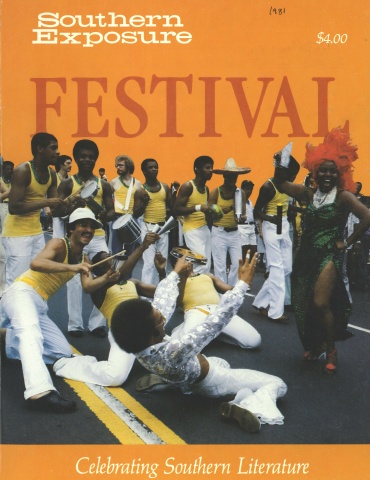One-Straw Revolution

This article originally appeared in Southern Exposure Vol. 9 No. 2, "Festival: Celebrating Southern Literature." Find more from that issue here.
for Mab and the Dragon
Scattering straw maintains soil structure and enriches the earth so that prepared fertilizer becomes unnecessary. This, of course, is connected with noncultivation. My fields may be the only ones in Japan which have not been plowed in 20 years, and the quality of the soil improves with each season . . . the surface layer, rich in humus, has become enriched to a depth of four inches during these years.
- Masanobu Fukuoka, The One-Straw Revolution
It’s traditional to talk revolution:
men have been doing it
for years. This year we
have been listening. We have seen
too many of our friends die
for being dark, or poor, or loving.
We know we may be next, any day.
And so we listen, and in the streets
we hear old mills grinding pain
into the taste of blood.
There’s a formula for revolution:
first you choose a flag, and then you die
a hero in the streets. Only the color
of the banner changes. My favorite
was the green. You remember.
That was the different battle, the one
to feed the world. Brave new plants
would blossom in the fields
and children would grow sleek
as new rice.
That was a lifetime ago. Now
we understand the old plants are lost,
the new seed cannot be saved. Each year
the hybrids must be bought,
and machines to plant and harvest,
and chemicals to burn the ground.
It was all designed that way:
Ford tractors and DuPont mud,
mainlining efficiency and poison.
Machines need room to grow,
so small fields become large:
the hedges are removed. Weeds and birds disappear,
tractors and wind move the earth at will.
People too are surplus. They go
to the cities to make more,
and on the streets
little girls make what they can
of life before they die.
This year the talk is revolution,
a quick shot to save the world.
This year we are listening.
We want to believe this time
it will be different. This time
the change will last
beyond the killing. Dreaming
in the night, I remember
they have done this before, and
it has never changed enough.
I hear there are women in the west
teaching their children to eat
cactus, and in the east
an old man is building
a world of straw. I think
there are worse things than growing
old and poor and dark,
worse things than loving
straws before the wind.
On opposite ends of the country you
my friends are plotting revolution.
In the west you spent your day
showing one more person how to live
a little out of line. Years ago
you kissed me and I walked out
further than you could go, but you
caught up with wonder.
And you in the class
are teaching poems and novels
and how to listen to what isn’t
said, and how to say it. You heard me
into being, and still do.
With you I have learned
we don’t always know what
we have planted or how
the harvest will come; But I know
we are making a new land.
You in the office, you in the class,
I in the hills, each of us
in her own garden, we will work
by the moon, by the month and year.
We will be slow and strong
as the moon pulling on the grain.
We will grow darker and tougher
and bitter as weeds pulling strength
from deep roots; we will bloom the colors
of all flags, and live as long
as we can.
Down in the garden
I am talking to the spiders.
Eat well, spin healthy webs. I hear
there are locusts coming.
This is how we make a revolution
that lasts: Do nothing
that is not necessary. Trust the weeds.
Avoid the quick fix. Lay down one straw
and another, and keep on living.